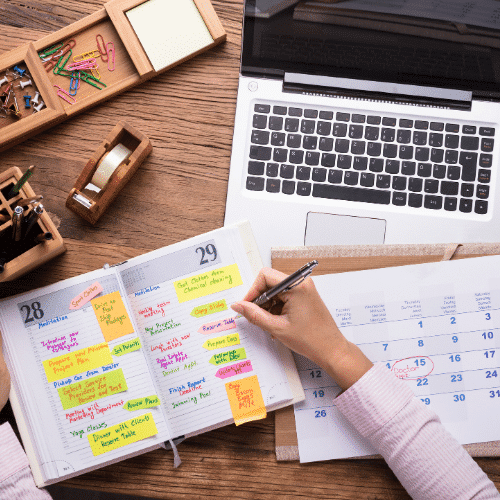Table of Contents
- 1 16 Mindful Ways To Stay Present & Focused In a Digital Word
- 1.1 1. Get an early start on the day.
- 1.2 2. Throughout the day, practice conscious breathing.
- 1.3 3. Maintain your focus on what is directly in front of you.
- 1.4 4. Practice mindful meditation in some way.
- 1.5 5. Set an intention for yourself in terms of your meditation practice.
- 1.6 6. Mark your calendar with reminders.
- 1.7 7. Incorporate mindfulness into the start of your work or school day.
- 1.8 8. Maintain a state of mindfulness throughout the day.
- 2 After you’ve completed these eight practices, you’ll be ready to shift your perspective and habits. Let’s have a quick discussion about this.
16 Mindful Ways To Stay Present & Focused In a Digital Word
Mindful “Pay attention. It is the only thing that matters.” The Warrior of Peace

This passage from Dan Millman’s book “Way of the Peaceful Warrior” emphasizes the importance of being fully present in every moment of one’s life.
We spend a lot of time worrying about the past or the future because our minds are so easily distracted, which causes us to miss out on opportunities and experiences that are right in front of us. Being in the present moment lets us fully interact with our surroundings and enjoy the beauty and richness of life as it happens right in front of us.
Being present also allows us to develop deeper and more meaningful relationships with those around us because we are better able to pay attention to their needs. It allows us to let go of the distractions and worries that can hold us back, allowing us to focus on what is truly important to us, such as our health, the quality of our relationships, and our own personal growth.
Last but not least, this adage serves as a gentle reminder to focus on living in the present moment and taking advantage of the opportunities and experiences that present themselves. As a result, we have the opportunity to live our lives to the fullest and most authentically, as well as form deeper and more meaningful connections with the people and world around us.
Life can feel completely out of control at times, making it difficult to stay present in the moment. Even if you are proud of your ability to multitask, the reality is that doing so limits the amount of focus and attention you can give to the current activity.
Instead of letting your mind wander or trying to do too much at once, focus on being mindful and changing your mindset to live a more present-focused life. This will allow you to live a more satisfying life.
Before delving into methods to remain present and focused in a technologically driven world, you should first educate yourself on the practice of mindfulness. Let’s start with a discussion about what we should do.
1. Get an early start on the day.

When you first wake up, you should not jump out of bed and begin getting dressed. Instead, take some time to yourself to lie in bed, focus on your breathing, and think about your current state of being and the world around you. Clear your mind of all the thoughts that have arisen during the day, and instead focus on your breathing and how you are feeling.
Instead of being overwhelmed by thoughts of the day ahead, try focusing on how the sheets of your bed feel against your arms, legs, and back. Take this into consideration, as well as any sounds or smells that may be present in your environment. This will make it easier for you to focus your attention on the present moment.
2. Throughout the day, practice conscious breathing.
Simply focusing on your breathing is one of the most effective ways to help you stay fully present in the here and now. Stop what you’re doing and take a few deep breaths before starting a task or doing something that will require a lot of your attention. Close your eyes, place your hands on the armrests of a chair with a straight back, and inhale deeply through your nose. After holding it for a few seconds, slowly let the air out through your mouth as you release it. Repeat until you feel calm and centered.
3. Maintain your focus on what is directly in front of you.
It’s possible that you have a habit of losing focus while having a conversation with another person or that you easily become sidetracked when you’re working on a project. Instead of becoming distracted and missing out on opportunities that are right in front of you, focus on living in the moment and taking in everything it has to offer.
Make eye contact with those who are speaking to you, and try to repeat back what they have said to you on a regular basis. This will assist you in holding yourself accountable.
In the course of a conversation with a friend about her difficulties in her romantic relationships, you might say to her something along the lines of, “So, it sounds like you’re saying that you weren’t really mad at him for not coming to the party, but that you were more hurt by it.” This not only makes you more present, but it also makes you a better friend and listener. You will notice an improvement in your life if you do this.
4. Practice mindful meditation in some way.

Meditation has been shown to be an effective way to reduce anxiety while also increasing mindfulness and compassion. It is one of several strategies for becoming more visible. Spend at least ten minutes each day meditating in a quiet and undisturbed environment. Choose a word, phrase, or favorite quote that will make you feel more relaxed, centered, and focused.
You could, for example, focus your thoughts on the words “present” or “focus.” Simply repeat it to yourself softly while sitting with your eyes closed. Make an effort to think only of that word. You could also meditate while going for a solitary walk or while taking a lunch break at work.
5. Set an intention for yourself in terms of your meditation practice.
Colleen Campbell, president and CEO of Ignite Your Potential, stated: “Make it a goal to meditate for five minutes every day for the next month.” You can meditate when you first wake up in the morning or when you get home from work in the afternoon. You can practice mindfulness even on your way to work. The two most important factors are consistency and deliberateness. It will be up to you at the end of the thirty days to decide whether or not to continue practicing meditation.
Yoga is a type of physical activity that combines stretching with mental practices like meditation and mindfulness. Find a yoga studio in your area or sign up for classes at your local fitness center. You can also practice yoga at home by watching yoga videos on the internet. This practice will not only improve your overall health, but it will also improve your ability to concentrate.
6. Mark your calendar with reminders.

Even if you make an effort to stay present, you will be distracted from time to time. In order to better prepare for these times, incorporate small reminders of mindfulness into your environment so that you can quickly center yourself when needed. Think about how it would look if you wrapped a white string around your wrist, for example.
7. Incorporate mindfulness into the start of your work or school day.
Remember that many of these strategies can be used in both the workplace and the classroom. Allow yourself a few moments to settle in, take some deep breaths, and make a conscious decision to focus when you first arrive. Recognize that there will be multiple people who require your attention throughout the day, but these few minutes are solely for you.
8. Maintain a state of mindfulness throughout the day.
In addition, you can make it a point to incorporate mindfulness practices into your daily routine. Allow yourself a few minutes before entering a meeting to relax and center yourself by taking some deep breaths. Use the time you would normally spend listening to music on your commute to concentrate on driving. Every now and then, when working out to music, it’s a good idea to take a break and listen to some silence.
After you’ve completed these eight practices, you’ll be ready to shift your perspective and habits. Let’s have a quick discussion about this.
1. Examine your proclivities.
Examine everything that has previously kept you from being truly present in order to achieve the goal of becoming truly present. It is possible that while you are at work, thoughts of your children begin to distract you and you begin to feel anxious or concerned about them. Perhaps you have a lot of negative feelings, such as guilt or frustration, that you have on a regular basis. Make a list of the feelings you have the most often, and then destroy or throw it away.
2. Recognize and accept your own feelings and thoughts
Even though being present necessitates paying undivided attention to everything around you, you should not ignore all of your negative thoughts and feelings. Ignoring a thought is the surest way to keep it in your mind; thus, give your negative emotions a moment or two, think about them, write them down, and then refocus on the task at hand. Ignoring a thought is the most effective way to keep it in your mind.
You might be thinking, “I acknowledge that I am still upset about the fight I had with my mother last night, but I cannot do anything about it right now.” I need to get started on my presentation preparations right away, but I’ll get back to her as soon as I can.”
3. Put your thoughts to the test.
Investigate any negative thoughts that are running through your head and determine whether they are significant enough to divert your attention away from the activity or person that is currently occupying your attention. Because your negative thoughts are frequently unfounded, you should try to delegitimize them whenever possible. Make an effort to gently bring yourself back to the present moment.
For example, you may be concerned that someone will attempt to break into your home. If, on the other hand, there have been no recent burglaries in your neighborhood or if you have a home alarm system, you may not need to be as concerned.
4. Concentrate your efforts on the most important issues.
Determine how to tell the difference between what is necessary and what is merely a distraction. Make a list of everything you need to do the day before and prioritize it based on what you plan to complete first. Make certain that you include everything on the list. Complete each task one at a time. Make sure to schedule time for yourself and your family every day.
When you arrive at work, one simple thing you can do to improve your efficiency is to prioritize your work emails before moving on to larger projects that require more of your time and effort.
5. Switch to airplane mode on your phone.
Although social media has helped advance and disseminate information in a variety of ways, it also has the potential to be the single most distracting habit you have. When you need to concentrate, turn off your phone or set it to silent mode. Consider deactivating some of your social media accounts or turning off your mobile device’s email.
Make it a household rule that no one can use their phone while eating dinner.
6. Follow your passion.
Doing things, you enjoy and are passionate about is one way to ensure that you are engaging in mindful behavior. Find a job that interests you, go on a date with the girl you’ve had a crush on for a while, and become more involved in the things that interest you. Make it worthwhile for yourself to be in this moment.
After all said, the time has come for us to delve deeper into the topic at hand, namely, “How to Stay Present and Focused in a Tech-Driven World. I have compiled a list for your convenience, and it’s available below.
1. Make a goal of completing at least three of your daily responsibilities in one sitting.
It would be easy for me to say, “Stop multitasking,” but given the number of tabs I currently have open in my browser, this would be both hypocritical and unrealistic. You will most likely continue to multitask certain tasks in order to keep up with all of your responsibilities, just as I will in the future.
Instead of trying to make a big change in your behavior, I suggest making a few small changes that will have an effect over a longer period of time. This will help you get back in touch with the here and now.
Choose a few things, like eating dinner or calling your mom on the phone, that you won’t try to do at the same time. Try not to look at the television. Don’t bother answering people’s emails. Concentrate solely on those aspects. It will only take you fifteen to thirty minutes a few times per day, but the difference will be noticeable, and it may even motivate you to do it more frequently.
2. If at all possible, you should avoid responding to emails and texts right away.
You may not have the option of responding at your own pace at your workplace. However, in order to demonstrate that you’re paying attention, you don’t have to rush off a response the moment someone questions you. You own your phone and laptop; they do not belong to anyone else.
People frequently expect immediate attention; however, keep in mind that you have control over how you respond to their expectations. People will not be surprised if you increase your response time; over time, they will realize that you respond to messages when it is convenient for you and you are ready—not earlier, unless it is an emergency. People will not be surprised if you increase your response time.
3. Pre-write some of your text messages to reduce the amount of time you spend on technology.
Most cell phones allow you to save time by sending a few pre-written messages. These messages include things like “I’ll be home later” and “I’m not sure,” amongst others. Typically, you will be able to personalize your own. I have the following suggestion:

- I am currently with my family. Send me a message via e-mail, and I’ll get back to you as quickly as I can.
- The workday has ended for the night. Send me an email, and I’ll respond to you first thing in the morning.
- Spending the day away from technology. I’ll respond to any texts you send the following day.
4. Put your electronic devices away when not in use.
It’s pointless to turn your dining room table into a shopping mall, especially if you’re going to have to eat in the middle of it. Put your iPod, phone, and other electronic devices in a drawer when not in use. Setting up a charging station near your desk or behind your couch is another good idea if you want to reduce the number of cords strewn about the room.
5. Reduce the amount of electronic equipment in your bedroom.
You might have gotten into the habit of doing your late-night browsing while lying in bed with your laptop and indulging in activities that tend to put people to sleep. Sleep experts say that to get a good night’s sleep, you should mentally and physically relax for at least an hour before going to bed. This should be accomplished by restricting stimulation.
Getting rid of the TV and computer will help you create an environment where you can relax and focus. After a long day, you need somewhere to unwind and relax. If you can keep the hustle and bustle of the outside world out of your private haven, it will feel much more tranquil.
6. When you’re finished browsing or working on the internet, close any unnecessary tabs.
It’s a minor issue that may not appear significant at first glance, but it has a significant impact on how I feel mentally. When I have more than fifteen tabs open at the same time, no matter how hard I try, my attention becomes scattered.
A key part of mindfulness practice is putting all of your attention on the task at hand, whether it’s sending an email or doing the dishes. Keeping only the information needed on the screen can make it much easier to focus on a single task.
7. Enlist the help of a friend to reduce the impact of technological distractions.
Even if you don’t take it personally, when your best friend starts texting while you’re eating lunch, you may begin to feel disconnected from them. I have no doubt that you have sometimes done something similar to this. I know that I have. I recently polled a few of my close friends to see if they could relate to being technology obsessed.
The next logical question to ask is, “Would you like to spend the afternoon with me without using any technology?” Only lunch and a movie are planned, with voicemails to be returned later. There will be no texting, tweeting, or Facebook updates. Even if only one friend agrees to spend the day with you without distractions, the effort will be well worth it. This concept will not be popular with everyone.
8. Write all of your correspondence by hand.
Following an interview, always send a follow-up email, as well as any lunch invitations or movie times. However, some items do not need to be delivered right away. When you write things down with a pen and paper, you are better able to connect with your feelings and be more present in the here and now. Furthermore, the recipients usually appreciate the time and effort you put into writing them.
Share with a friend what you admire most about her. Write a letter to your sister thanking her for coming and expressing your gratitude for her presence. Nothing beats taking the time to enjoy something without interruptions and then realizing that your enjoyment has an impact on someone else.
I usually make lists of ten recommendations because ten is a nice, round number; however, I’ve decided to spend less time on my laptop this afternoon.
So, here’s my question: how do you maintain your presence and stay focused in a world where technology reigns supreme?
9 Reasons To Counting You Blessings (Even When Life Is Not Perfect Right Now!)
The Silent Killer Of Your Relationships: Disengagement
10+10 Recommendations For Laughter And Happier Times
Predictions And Comments For The 12 Zodiac Signs In April 2023

